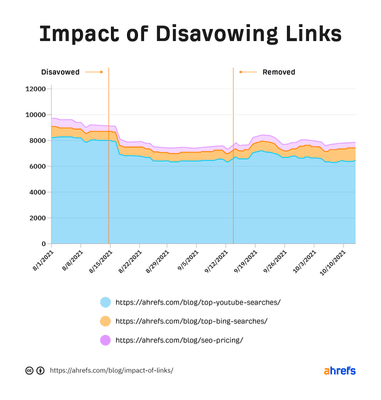To further highlight the importance of maintaining an optimal backlink profile, I’ve noted some common issues caused by a lack of backlink analysis below:
Rankings held back
As mentioned above, various link-based algorithms such as Penguin seek to ignore spammy/illegitimate links to a degree, however, disavowing successfully can help to improve rankings by removing any association with poor/toxic websites.
Here is one of many case studies which showcase the impact of successfully disavowing the right links.
Google penalty
Another possible negative result of not auditing your backlink profile is receiving a Google penalty. You can check for penalties in your Search Console account under ‘manual actions’. There are many different types of Google penalties, such as manual review penalty (typically you would be notified of the issue, and you can then look to resolve it and submit for a review) and a sitewide penalty (this is much more serious, and can result in a drastic drop in rankings and potentially even affect indexation).
Penalties can be very time consuming to review and get removed, but they can be resolved, as highlighted in this manual penalty case study by Ahrefs. Therefore, it’s better to ensure you avoid these via good upkeep of your backlink profile.
Over-optimised anchor text
When a website links to you, unless it’s an image or hidden link, it will have an anchor text attached to it. If you want to reinforce relevancy and accurately highlight what you’re linking to, you will want to use some form of target anchor text. Most of the time, we can’t control this, however, in certain cases where we are providing content or being mentioned, we may have a say on the anchor used. You can find examples of different anchor types for guidance here.
If not audited frequently, and especially if a site has had previous link building which wasn’t ideal, you can run into issues of over optimisation with anchors. This is where a page is linked to with a seemingly unnatural amount of target anchors. If spotted, however, you can look at ways of removing this issue via disavowing.
Here is a page from a playground equipment company that is being affected by over optimised anchors from what looks like bad link building practises. Over 20% of the profile is made up of exact match anchors to the school playground equipment page, with a high number of partial target anchors as well. This is a clear case, but often you’ll want to compare your anchor profile to competitors as well for reference.


